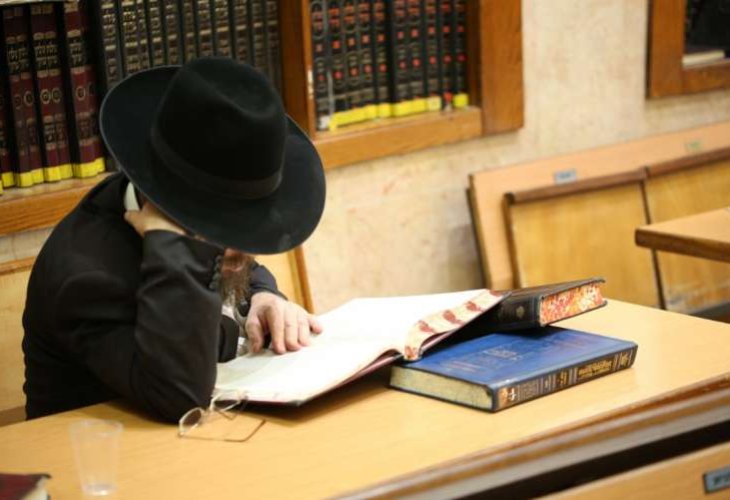Faith
The Protective Power of Torah Study: How Learning Defends Against Danger
Stories, sources, and real-life examples of how Torah study shields individuals, communities, and soldiers in times of crisis
 (Photo: Shutterstock)
(Photo: Shutterstock)The importance of Torah study is paramount, to the extent that it carries the power to prevent disasters.
Rabbi Yitzchak Zilberstein explains that Torah study is not only about ‘turning away from evil,’ but also about ‘doing good.’ The first thing a person should do is learn Torah — think about a question, review a Mishnah, and learn aloud, for Torah protects and saves. As our Sages said in Makkot: Rabbi Yochanan taught that Torah words ‘offer refuge’, as it is written, "Then Moses set aside Bezer (city of refuge) in the wilderness…" followed by, "And this is the Torah." What does Torah protect from? From the Angel of Death. Especially when learned aloud, speaking words of Torah provides the greatest protection.
Shlomo Hamelech (King Solomon) wrote: “She will give to your head a wreath of grace; a crown of beauty she will bestow upon you. She will protect you.” (Mishlei 4:9).
Jacob’s Hint to Esau
When Yaakov (Jacob) met Esav (Esau), he said: “I lived with Lavan” (Bereishit 32:5). Rashi explains: the word garti (“I lived”) has the numerical value of 613 (taryag), hinting: “I kept the 613 mitzvot.” In his work Arugat HaBosem, Rabbi Moshe Greenwald adds: Yaakov was hinting to Esav, “I kept the mitzvot, but I wasn’t able to study deeply, for Lavan did not allow me. If I had been able to immerse in Torah, I would not have feared you or offered you gifts, because the Torah itself would have been my shield.”
Torah Protects in War
During the First Lebanon War, the IDF prepared for a dangerous operation in which planes were to penetrate Syrian airspace. Then-Chief of Staff Rafael Eitan called Rabbi Shach: “Rabbi, this operation is risky. We want Ponovezh Yeshiva to learn Torah so the mission will succeed.”
It was the afternoon rest hour, but Rabbi Shach personally went from room to room, waking the students saying: “There’s a difficult mission now — we must pray for the soldiers’ success.” The entire yeshiva rose to pray. With Hashem’s help, the operation succeeded, destroying Syrian missile batteries that threatened Israel.
The verse says: “Our feet were standing at your gates, Jerusalem” (Tehillim 122:2). The Midrash explains: David said, “What caused our feet to stand strong in battle? The gates of Jerusalem where Torah is studied.” (Makkot 10a).
Torah study protects all of Israel, and indeed, we often see that many security incidents occur during yeshiva breaks, when Torah learning is weakened.
Torah Protects Soldiers and the Home
Before battle, Moshe gathered “a thousand from each tribe” — a thousand for war, and a thousand for Torah study. He understood that soldiers in combat need the shield of Torah learners behind them.
The Talmud adds: “Any house where words of Torah are heard at night will not be destroyed.” (Eruvin 18b). The Ben Ish Chai explains: “Heard” means the husband studies aloud and the wife listens — even if she doesn’t understand. A house with Torah in it has protection.
Torah Study on the Bus Saves Lives
Two young men were riding a bus when a suspicious passenger boarded. Alarmed, one said to his friend: “Let’s learn together.” They opened a small Talmud and began learning. At a checkpoint, a soldier boarded, removed the suspicious man, and discovered he carried a knife and intended a stabbing attack. The terrorist later admitted: “I wanted to stab, but I felt as if something was holding me back…”
King David and the Angel of Death
David Hamelech (King David) knew he would pass away on Shabbat. Every Shabbat he immersed himself in constant Torah study. When the appointed time came, the Angel of Death could not overpower him, for he never stopped learning. What did the Angel do? He shook the trees in David’s garden, creating a disturbance. David went to see, paused his Torah study, climbed a step that broke beneath him, and at that moment, his soul departed (Shabbat 30a).
Torah learning protects not only individuals, but entire communities, soldiers at war, and even travelers on a bus.

